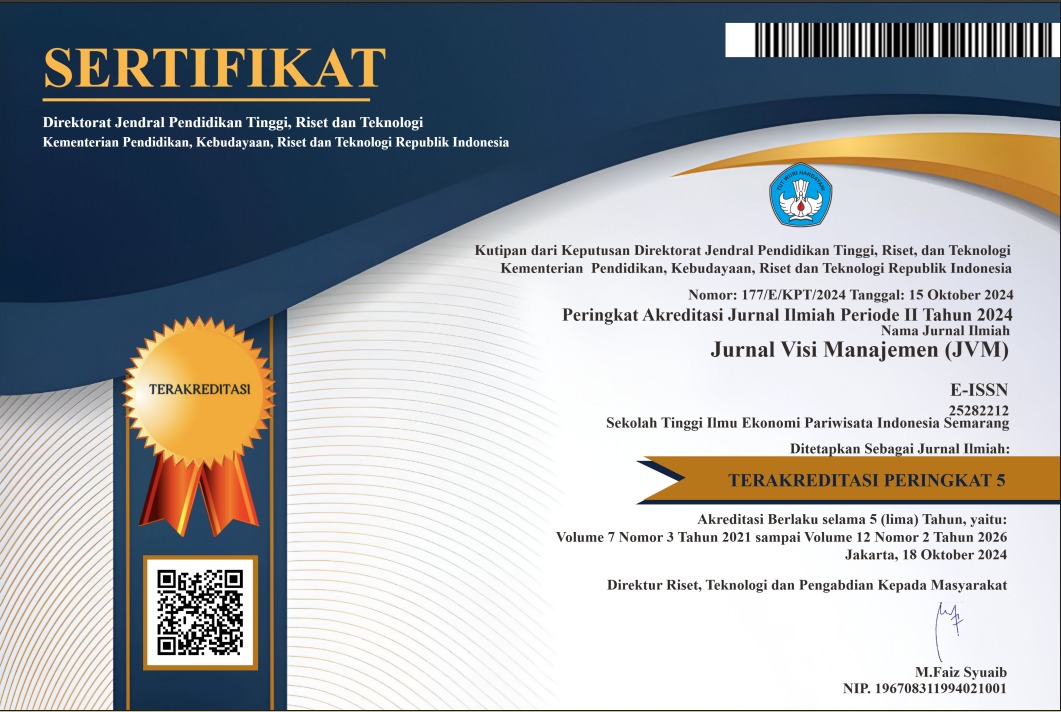Peran Pendapatan sebagai Variabel Moderasi Terhadap Faktor-Faktor yang Mempengaruhi Minat Investasi Mahasiswa di Provinsi Lampung
DOI:
https://doi.org/10.56910/jvm.v11i2.680Keywords:
Capital, Investment interest, Knowledge, Risk tolerance, Social media influencerAbstract
This study seeks to understand how students in Lampung Province are influenced by social media influencers, their level of investment knowledge, their capital, and their risk tolerance when it comes to investing. The research highlights the significant role of investment in the economic system, emphasizing its dual function as a funding source for companies and an opportunity for investors to gain returns. The increasing trend of investment in Indonesia, particularly among the youth, indicates a growing interest in capital markets. Utilizing a quantitative approach, data was collected from 136 active students through online questionnaires. The study used multiple regression methods to look at how investment interest was correlated with the independent variables (knowledge of investing, capital, risk tolerance, and social media influencers). The findings reveal that investment knowledge and the percentage of income allocated for investment positively and significantly affect students' investment interest. Conversely, the influence of social media and risk tolerance did not show a direct impact. Notably, income as a moderating variable demonstrated a complex role, weakening the direct effects of knowledge and investment percentage while strengthening the influence of risk tolerance. The study suggests enhancing financial literacy programs and encouraging early financial management education to foster investment interest among students.
References
Adil, M., Singh, Y., & Ansari, M. S. (2022). How financial literacy moderate the association between behaviour biases and investment decision? Asian Journal of Accounting Research. https://doi.org/10.1108/AJAR-09-2020-0086
Aini, N., Maslichah, & Junaidi. (2019). Pengaruh pengetahuan dan pemahaman investasi, modal minimum investasi, return, risiko dan motivasi investasi terhadap minat mahasiswa berinvestasi di pasar modal (Studi pada mahasiswa Fakultas Ekonomi dan Bisnis Kota Malang). E-JRA, 08(05), 38–52.
Baihaqqy, M. R. I., Disman, Nugraha, & Sari, M. (2020). The correlation between education level and understanding of financial literacy and its effect on investment decisions in capital markets. Journal of Education and E-Learning Research. https://doi.org/10.20448/journal.509.2020.73.306.313
Bailey, J. J., & Kinerson, C. (2005). Regret avoidance and risk tolerance. Journal of Financial Counseling and Planning.
BKPM. (2025). Realisasi investasi. https://www.bkpm.go.id/id/info/realisasi-investasi/2025
Brasoveanu, L. O., Dragota, V., Catarama, D., & Semenescu, A. (2008). Correlations between capital market development and economic growth: The case of Romania. Journal of Applied Quantitative Methods, 3(1), 64–75.
Budiarto, A. (2017). Pengaruh financial literacy, overconfidence, regret aversion bias, dan risk tolerance terhadap keputusan investasi (Studi pada investor PT. Sucorinvest Central Gani Galeri Investasi BEI Universitas Negeri Surabaya). Jurnal Ilmu Manajemen (JIM).
Dash, P., & Mishra, S. K. (2024). Investment intentions and financial decisions of women investors: A bibliometric analysis for future research. Global Business and Finance Review, 29(6), 114–128. https://doi.org/10.17549/gbfr.2024.29.6.114
Doğan, M., Metin, Ö., Tek, E., Yumuşak, S., & Öztoprak, K. (2020). Speculator and influencer evaluation in stock market by using social media. IEEE International Conference on Big Data (Big Data).
Elshaer, I. A., & Sobaih, A. E. E. (2023). Antecedents of risky financial investment intention among higher education students: A mediating moderating model using structural equation modeling. Mathematics. https://doi.org/10.3390/math11020353
Firdaus, R. A., & Ifrochah, N. (2022). Pengaruh pengetahuan investasi dan motivasi investasi terhadap minat investasi mahasiswa Politeknik Keuangan Negara STAN di pasar modal. Jurnal Keuangan Negara dan Kebijakan Publik.
Gede, I., Perdana, B. W., & Yasa, G. W. (2021). The effect of minimum investment capital, financial literacy level, and family environment on students' investment interest in the Indonesian capital market. American Journal of Humanities and Social Sciences Research.
Halim, A. (2005). Analisis investasi (Ed. 1). Salemba Empat.
Harjono, D. K. (2012). Hukum penanaman modal; Tinjauan terhadap pemberlakuan Undang-Undang No. 25 Tahun 2007 tentang penanaman modal. Pusat Pengembangan Hukum dan Bisnis Indonesia.
Hayati, A. F., Syofyan, R., & Marna, J. E. (2023). Analysis of student investment decisions in the era of Industrial Revolution 4.0. In Proceedings of the Ninth Padang International Conference on Economics Education, Economics, Business and Management, Accounting and Entrepreneurship (PICEEBA 2022) (pp. 224–231).
Hudders, L., De Jans, S., & De Veirman, M. (2021). The commercialization of social media stars: A literature review and conceptual framework on the strategic use of social media influencers. International Journal of Advertising.
Hussain, S., & Rasheed, A. (2023). Risk tolerance as mediating factor in individual financial investment decisions: A developing-country study. Journal for Studies in Economics and Econometrics. https://doi.org/10.1080/03796205.2023.2218053
KSEI. (2025). Statistik pasar modal Indonesia. https://www.ksei.co.id/files/Statistik_Publik_Januari_2025_final.pdf
Lestari, M. D., & Wardani, D. K. (2020). Pengaruh literasi keuangan, risk tolerance, dan status pekerjaan terhadap keputusan investasi. Jurnal Keuangan dan Bisnis, 18(1), 89–106. https://doi.org/10.32524/jkb.v18i1.628
Lestiana, & Nurfauziya, A. (2023). Pengaruh pengetahuan investasi, kebijakan modal minimum, literasi keuangan dan social media influencer terhadap minat mahasiswa berinvestasi di pasar modal. NCAF, 5, 136–149. https://doi.org/10.20885/ncaf.vol5.art16
Listyani, T. T., Rois, M., & Prihati, S. (2019). Analisis pengaruh pengetahuan investasi, pelatihan pasar modal, modal investasi minimal dan persepsi risiko terhadap minat investasi mahasiswa di pasar modal (Studi pada PT Phintraco Sekuritas Branch Office Semarang). Jurnal Aktual Akuntansi Keuangan Bisnis Terapan (Akunbisnis), 2(1), 49.
Mahdi, S. A., Jeandery, G., & Wahid, F. A. (2020). Pengetahuan, modal minimal, motivasi investasi dan minat mahasiswa untuk berinvestasi di pasar modal. Jurnal Ekonomi, Akuntansi dan Manajemen Multiparadigma.
Marfuah, M., & Dewati, A. A. (2021). Determinan minat mahasiswa berinvestasi pada pasar modal. Akurasi: Jurnal Studi Akuntansi dan Keuangan, 4(1), 45–60. https://doi.org/10.29303/akurasi.v4i1.71
Marlin, K. (2020). Pengaruh pengetahuan investasi, persepsi return, dan motivasi investasi terhadap minat investasi pada Galeri Investasi Syariah Bursa Efek Indonesia IAIN Batusangkar. Jurnal Ilmiah Indonesia.
Mukhdoomi, A. M., & Shah, F. A. (2023). Risk tolerance in investment decisions: Are personality traits the real triggers? NMIMS Management Review, 31(4), 256–264. https://doi.org/10.1177/09711023241230433
Mutawally, F. W., & Asandimitra, N. (2019). Pengaruh financial literacy, risk perception, behavioral finance dan pengalaman investasi terhadap keputusan investasi mahasiswa Surabaya. Jurnal Ilmu Manajemen, 7(4), 942–953.
Nguyen, L., Gallery, G., & Newton, C. (2016). The influence of financial risk tolerance on investment decision-making in a financial advice context. Australasian Accounting, Business and Finance Journal.
Nur Aini, N. S., & Lutfi, L. (2019). The influence of risk perception, risk tolerance, overconfidence, and loss aversion towards investment decision making. Journal of Economics, Business, & Accountancy Ventura. https://doi.org/10.14414/jebav.v21i3.1663
Otoritas Jasa Keuangan. (2025). Statistik pasar modal Indonesia. https://ojk.go.id/id/kanal/pasar-modal/data-dan-statistik/statistik-pasar-modal/Default.aspx
Pradnyawati, & Sinarwati. (2022). [Data publikasi tidak lengkap].
Pratiwi, D. T. (2020). Pengaruh pengetahuan investasi, modal awal investasi, dan social media influencer terhadap minat mahasiswa berinvestasi di pasar modal. [Tugas akhir/skripsi atau jurnal tidak disebutkan].
Putri, F. K. (2017). Pengaruh faktor kepribadian terhadap toleransi risiko keputusan investasi saham. [Tugas akhir/skripsi atau jurnal tidak disebutkan].
Putri, W. N. D., & Adawiyah, W. (2020). The effect of behavioral finance and financial literacy on investment intentions among Indonesian investors. In Research on firm financial performance and consumer behavior.
Rachman, R. A., & Syaiah. (2022). Studi kasus investor di MNC Trade Syariah Kendari. Jurnal Akuntansi dan Keuangan (JAK), 7(2). http://jak.uho.ac.id/index.php/journal/issue/archive
Rodiyah, F. (2019). Korelasi pengetahuan investasi, literasi keuangan, pelatihan pasar modal dan minat mahasiswa berinvestasi di Galeri Investasi Syariah. Jihbiz: Jurnal Ekonomi, Keuangan dan Perbankan Syariah.
Samsuri, A., Ismiyanti, F., & Narsa, I. M. (2019). The effects of risk tolerance and financial literacy to investment intentions. International Journal of Innovation, Creativity and Change.
Shanmugam, K., Chidambaram, V., & Parayitam, S. (2022). Effect of financial knowledge and information behavior on sustainable investments: Evidence from India. Journal of Sustainable Finance and Investment. https://doi.org/10.1080/20430795.2022.2073958
Sugiyono. (2017). Metode penelitian bisnis (Pendekatan kuantitatif, kualitatif, kombinasi dan R&D). Alfabeta.
Syaparuddin. (2019). A study of investment pattern through economic sectors-based in Indonesia. International Journal of Innovation, Creativity and Change, 9(2), 227–239.
Taufiqoh, E., Diana, N., & Junaidi. (2019). Pengaruh norma subjektif, motivasi investasi, pengetahuan investasi, persepsi return dan literasi keuangan terhadap minat mahasiswa berinvestasi saham di pasar modal (Studi empiris pada mahasiswa akuntansi FEB UNISMA dan UNIBRAW di Malang). E-JRA.
Trisnaningsih, T., Sihabudin, S., & Fauji, R. (2022). Pengaruh influencer dan literasi keuangan terhadap minat investasi mahasiswa. Journal of Business and Economics Research (JBE), 3(2), 82–89. https://doi.org/10.47065/jbe.v3i2.1705
Van Rooij, M. C. J. (2011). Financial literacy and retirement planning in the Netherlands. Journal of Economic Psychology, 32(4), 593–608.
Viana, E. D., Febrianti, F., & Dewi, F. R. (2022). Literasi keuangan, inklusi keuangan dan minat investasi generasi Z di Jabodetabek. Jurnal Manajemen dan Organisasi, 12(3), 252–264.
Wibowo, A. (2019). The influence of investment knowledge, minimum investment capital policies, and capital market training on investment interest (A case study of FE Unesa students registered at the FE Unesa Investment Gallery). Journal of Management Science, 7(1), 198.
Wulandari, A., Rahmadhina, N. M., & Muda, I. (2024). The impact of income on investment interest among millennials in capital market (the implementation of theory of planned behaviour). Brazilian Journal of Development. https://doi.org/10.34117/bjdv10n1-010
Downloads
Published
How to Cite
Issue
Section
License
Copyright (c) 2025 Jurnal Visi Manajemen

This work is licensed under a Creative Commons Attribution-ShareAlike 4.0 International License.







